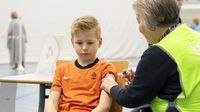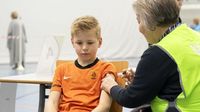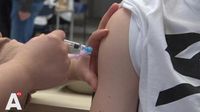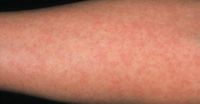The Netherlands is witnessing a concerning rise in measles cases, with health officials reporting that since the beginning of this year, there have been a total of 108 confirmed infections. The latest figures from the Rijksinstituut voor Volksgezondheid en Milieu (RIVM) reveal that 45 new cases have emerged in just the past two weeks, marking a swift escalation in what many are calling a worrying trend.
This uptick in measles infections has been particularly emphasized in four elementary schools located in several regions, including Amsterdam, Rotterdam-Rijnmond, Haaglanden, and Brabant-Zuidoost. The RIVM has made it clear that there is no widespread outbreak affecting the entire nation at this point; however, the concentration of cases at these schools has raised alarms among public health officials.
Health officials, like those at GGD Amsterdam, have confirmed that while the initial infections began in schools, they are now appearing more broadly across communities. "We are seeing the number of new reports climb in the city, and we expected this increase due to the low vaccination rates we’re observing," a spokesperson for GGD Amsterdam commented.
Statistics indicate that the vaccination rate in Amsterdam hovers around 80 percent. Experts note that a rate of at least 95 percent is necessary to effectively prevent outbreaks of the disease. As it stands, many individuals, particularly children, are still susceptible. Notably, the RIVM had previously seen the number of measles infections relatively stable but has now reported that there were only 55 recorded cases during the same timeframe in March 2024, illustrating the sharp contrast between the two years.
Much of the new spread has been attributed to travel-related cases, with at least seventeen individuals identified as having contracted the disease while visiting Morocco, where there are currently extensive outbreaks. Reports indicate that over 100 deaths have occurred in Morocco due to measles, and three additional cases have been linked to Romania.
In response to rising concerns, State Secretary Karremans from the Ministry of Health, Welfare and Sport (VWS) is actively pushing for increased public awareness campaigns surrounding vaccinations. "It is unacceptable that diseases like measles are becoming more common in 2025, undermining the progress made by medical science," Karremans stated. His office is focusing on localized initiatives that provide easy access to reliable vaccination information and resources to parents.
The situation is not entirely unprecedented; the Netherlands has faced relatively small outbreaks of measles before, the most recent being a significant incident between 2013 and 2014 that saw thousands of cases reported. Each major outbreak tends to occur roughly every ten to fifteen years, often correlating with declining vaccination rates.
In addition to the malady’s prevalence among young children, the disease remains one of the leading causes of severe outcomes in children globally. Although the chance of severe complications in the Netherlands is lower, with approximately one in ten thousand infections leading to fatalities, the potential for pneumonia and meningitis persists, raising the stakes regarding immunization. The RIVM continues to maintain their stance recommending that children receive vaccinations according to the National Immunisation Programme, which includes the MMR (measles, mumps, rubella) vaccine administered at 14 months and again at three years of age.
"Children must receive their vaccinations to protect themselves as well as others in their community," emphasized Ellen Kielestijn, a parent who tragically lost her son Anand to measles complications. She has become a vocal advocate for vaccinations, underscoring the gravity of vaccine-preventable diseases.
Despite ongoing recommendations and awareness efforts, resistance to vaccination remains strong in certain groups for reasons ranging from religious beliefs to general hesitancy following the pandemic. As a result, the RIVM is encouraging immunization, reminding the public that failure to vaccinate puts communities at risk.
The current increase in measles infections in the Netherlands symbolizes a troubling trend that requires urgent attention and action from both health officials and the public. As those in leadership positions strive to improve vaccination rates, the focus remains on preventing a larger-scale outbreak and protecting vulnerable populations. With the climb in cases already significant, the necessity for efficient action and public cooperation is more pressing than ever.








